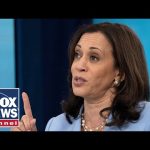In the current political landscape, as the nation gears up for the upcoming election, the importance of foreign policy cannot be understated, especially for those in the evangelical community who understand the necessity of moral clarity in international relations. The differing approaches of the presidential candidates provide a critical moment for believers to engage in prayerful reflection and to foster conversations about how these policies align with their values and convictions.
One of the most pressing issues is the ongoing conflict involving Israel and Hamas, which has profound significance for many Christians who view Israel as a key player in biblical prophecy. Former President Trump’s stance of supporting Israel’s right to defend itself contrasts sharply with the more cautious approach that some fear would continue under Kamala Harris. The concern within evangelical circles is not merely about international politics, but about the moral implications of the U.S. role in supporting an ally that many believe is central to God’s plan. It is crucial for voters to consider how their choices could impact not only the lives of people in that region but also the overarching narrative of faith that connects believers to Israel.
Another significant area of concern is the American response to Iran and its threat to both regional stability and global safety. Trump’s plan to reinstate tough sanctions and challenge Iran’s nuclear ambitions aligns with a biblical perspective that values righteousness and justice. Many in the evangelical community see the need to support those who strive for freedom and democracy, including the citizens of Iran oppressed by authoritarian rule. In contrast, the belief that a more lenient approach may return to power under Harris raises alarms about the potential ramifications for both Israel and the broader Middle East, leading to instability that could deepen the suffering of innocent lives.
China, a major global player, presents another critical area where foreign policy will shape the future. Believers are called to be wise and discerning, understanding that weakness in diplomacy can embolden those who do not share our values. The implications of a potential Harris administration’s policies toward China are concerning. Lack of firmness may lead to greater aggressions that threaten nations like Taiwan and create challenges for the global church. Evangelicals must recognize the interconnectedness of faith and politics in advocating for a strong stance in the face of tyranny.
Additionally, understanding the situation in Ukraine is vital, especially when considering the lessons learned from previous conflicts. The evangelical community often seeks to support efforts that promote peace, but they also understand that sometimes strength and resolve are required to deter aggression. The contrasting visions for U.S. involvement in Ukraine could lead to either prolonged conflict or the opportunity for a return to peace, influencing not just American interests but global stability in line with God’s desire for order and justice.
As the political landscape unfolds, it is essential for those within the evangelical community to not only engage in the discussion but to root their perspectives in prayer and scripture. They are encouraged to seek God’s wisdom and guidance, to consider how their votes reflect their values, and to advocate for policies that promote righteousness and peace. In doing so, they fulfill their calling to be salt and light, navigating the complexities of modern politics with the hope and conviction that comes from their faith. This election season reminds believers that their voices matter, and they have the opportunity to influence the course of history in alignment with God’s will.




